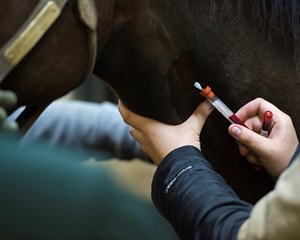Kentucky EDRC Approves Additional Funds to mRNA Study


The Kentucky Equine Drug Research Council approved a motion Feb. 4 to provide $40,000 in additional funding for the third and final phase of a messenger RNA study headed by Dr. Allen Page, staff scientist and veterinarian at the University of Kentucky's Gluck Equine Research Center.
The EDRC is an advisory board for the Kentucky Horse Racing Commission that makes recommendations to the full commission. The KHRC regularly passes EDRC recommendations.
The ongoing study, in its fourth year, seeks to identify markers in blood samples to ascertain if molecular red flags can be determined to show racehorses at risk of catastrophic injury. The first two phases of the project have been highly successful, Page told the EDRC, finding three such markers, with the hope that researchers can determine more in the final phase.
He declined to identify the markers to EDRC members, stating that their data had not yet been submitted for publication but called all three "interesting."
Phase three of the project will occur in Southern California, where horsemen, tracks, interest groups, and the state's regulator have agreed to participate in an estimated 15,000-sample study. Samples from horses will be collected at the time of total carbon dioxide testing.
Page and Dr. Bruce Howard, equine medical director for the Kentucky Horse Racing Commission, explained to the EDRC that the study is taking place in California rather than Kentucky in part due to logistics in collection. They said that with samples from Kentucky horses taken at the time of Lasix administration, 2-year-olds and stakes horses would have been omitted. Those races are run without Lasix.
Additionally, horses in California are also more apt to make multiple starts for follow-up testing, Page said, more so than Kentucky horses, who might be shipped to different states for racing at various times of the year.
Page told the EDRC that the costs for the project had risen. He said Keeneland, The Stronach Group, and the New York Racing Association have given verbal gift commitments to the project.
Members of the EDRC, noting that Kentucky has funded much of a study that could benefit horses across the country, asked Page and Howard to reach out to California's regulator, the California Horse Racing Board, to pitch them in sharing in funding support.
Scott Chaney, executive director of the CHRB, who did not participate in the meeting and was reached afterward by telephone, expressed surprise at the request. He said the CHRB, to his knowledge, does not directly fund research in its role as a regulator.
Before the EDRC passed a motion to fund $40,000 toward the project, Page confirmed the study was about $90,000 short of projected needs.
Earlier during a question-and-answer session with Page, racetrack veterinarian Dr. Mark Cheney questioned how the mRNA findings would be accepted once the study is complete. He speculated how owners and trainers might react if test results showed their horses as high risk.
"What's the process you think we can implement this where we can really use it to convince the trainers to stop on these horses and give them time off?" he asked Page.
"I think that's a good question, Dr. Cheney, and it's one we've discussed internally a lot," Page replied, acknowledging that he didn't have a great answer. "I think, as a researcher, I feel like my role and responsibility is to do what we can to support the industry and help the industry answer questions and address needs. And then let the industry figure out how best they want to implement something."
